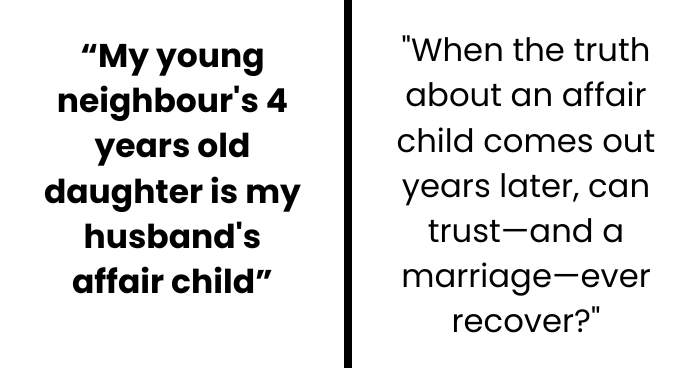My Husband’s Affair with Our Young Neighbor Left Me Betrayed and Broken
Infidelity is a horrible breach of trust, but finding out your husband has a child with a much younger woman—his former neighbor—is just next-level cruel. This woman, her husband a successful businessman, discovered the news in a wave: her 24-year-old neighbor, his mistress. This young woman and her child had been supported for years out of her goodness but all the while her husband was secretly the little girl’s father.
Truth came out when the grandmother of the young lady, who was involved in this act broke out in guilt. The affair, the paternity, even the silent money transfers he’d been sending — €1,500 a month — all unknowingly to her. Betrayed and feeling like not enough, and wondering whether to stay married, or to believe in herself, or to do anything at all.
The pain that comes with betrayal can be very deep, and sometimes it comes from the ones in our home— or the one next door

The author mentioned to her husband that their neighbor had a crush on him, but he reassured her that he would maintain boundaries
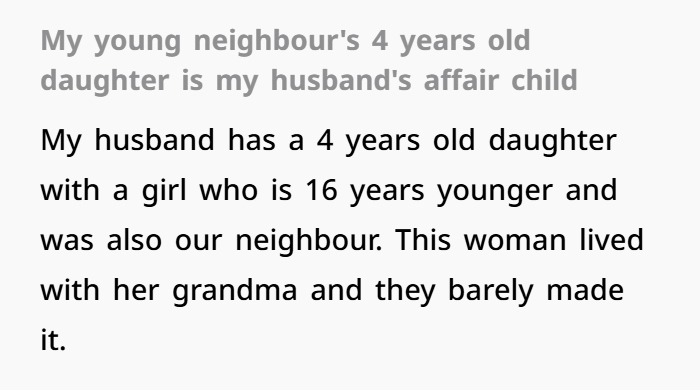

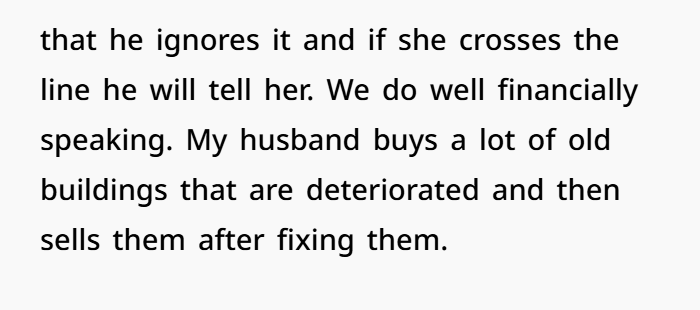
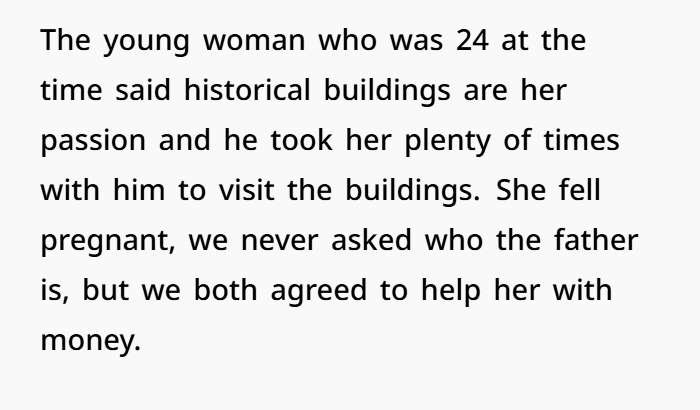
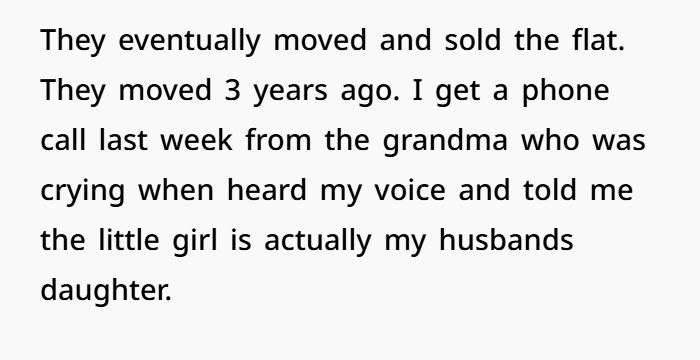


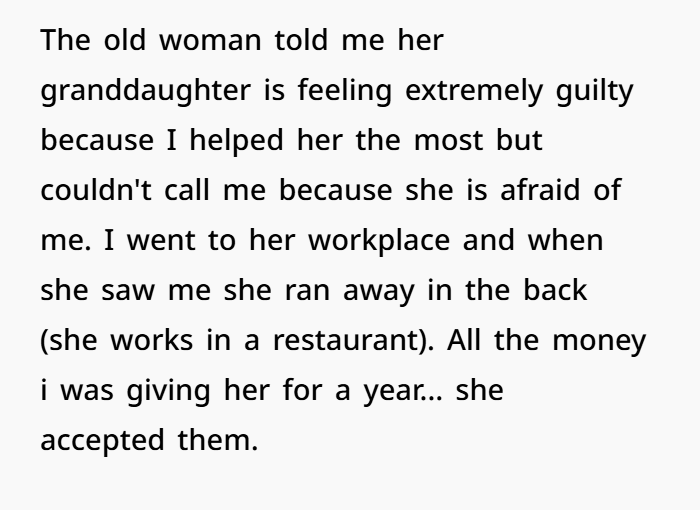
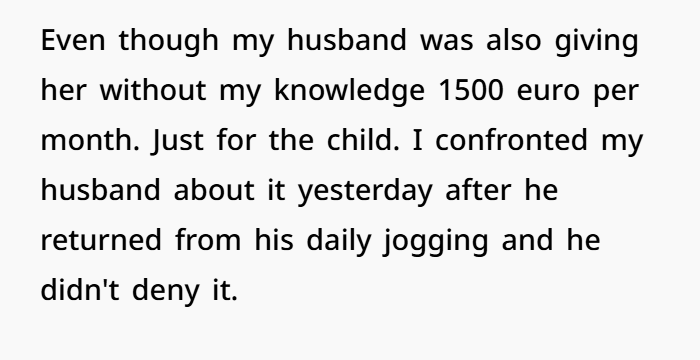
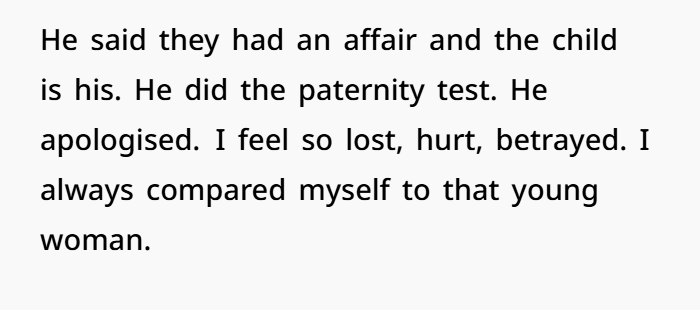


Infidelity, Deception, and Rebuilding After Betrayal
1. The Emotional Impact of Infidelity and Secret Children
An infidelity usually breaks the trust — and a lot more apart from someone’s identity and sense of security. The revelation that a husband or wife has conceived a child with a partner on the side brings with it all the complications and emotional damage this brings. Psychology Today reports that infidelity with deception around money or kids is the ultimate betrayal, because it sabotages three aspects of a relationship: sex, trust, and mutual purpose (the shared goal of raising a family).
This time around, the betrayal is heightened because the wife was unwittingly complicit, providing financial help out of compassion. The value of being taken for granted: being kind equals humiliation and heartbreak.
2. The Power Imbalance in Affairs with Younger Women
This is an age gap—16 years in this case—that jumps out in its shape. The power dynamic tends to come into play when older, settled, successful men mess around with younger women in insecure situations. The young lady who slept there was living with her grandmother in poverty, depending on assistance from others to feed her. That context does not absolve her of responsibility, but it does show how economic and emotional vulnerabilities can make the lines hazy and dependence flow.
According to research released by the Journal of Marriage and Family, the most common affairs have power dynamics at play; one partner is often financially dominant whereas the other is under their shadow — both affairs are about power and dependency. The wife is even angrier that her husband not only had the affair, but kept financial connections to the other woman open for all these years.
3. Dealing with Feelings of Inadequacy and Self-Blame
The wife comparing herself to the younger, ‘very beautiful’ woman and how she sounds, is sad but understandable. When someone suffers infidelity they commonly feel the infidelity is a reflection of something wrong with them and often ask “What did I do wrong?” or on: “What does she have that I don’t?” This is normal for people to feel but very unfair. Cheating is a decision made by the unfaithful partner and is not a judgment on the worth or appearance of the betrayed partner.
Marriage experts at The Gottman Institute, which researches the science of how relationships work, explain that infidelity results from problems in the unfaithful partner, whether those problems are about being unsatisfied, feeling entitled, or wanting to escape the relationship, rather than any failure on the part of the betrayed partner. The focus remains on rebuilding self-worth and confidence, rather than self-blaming.

4. Financial Deception: A Betrayal of Trust
Not only do you feel the betrayal emotionally, but also financially as the trust is broken again. Cloistered handing out €1,500 a month for a kid—and without full disclosure—is financial infidelity, just as damaging as emotional or physical infidelity. Financial infidelity can make partners feel devalued, powerless, and shut out of sweeping decisions.
A CreditCards. According to a com survey, 31 percent of married adults have concealed financial choices from their partners, a secret spending and support are key marital conflict triggers. Here, the wife was actively donating money without the knowledge of the fact that her husband was donating under the guise, which amplifies the betrayal.
5. Steps Forward: Coping and Decision-Making
While the emotional fallout feels overwhelming, there are steps she can take to regain control and clarity:
- Seek Support: Therapy, whether individual or couples’ counseling, can help process the betrayal and provide tools to navigate complex emotions. Support groups for infidelity survivors, like those facilitated by Beyond Affairs Network, can also be invaluable.
- Set Boundaries: Decide what you need to feel safe and respected moving forward. Whether it’s space, complete transparency, or ending the relationship, your feelings and boundaries matter.
- Focus on Self-Care: Rebuild your sense of self through activities, hobbies, or social support that nurture your emotional well-being. Your worth is not defined by your appearance or your husband’s choices.
- Evaluate the Future of the Relationship: Forgiveness and reconciliation are possible, but they require accountability, honesty, and effort from both parties. If staying feels impossible, separating may be the healthiest choice.
The advice from netizens for the OP is clear and it revolves around moving on from her husband, reclaiming self-worth, and leaving the past behind






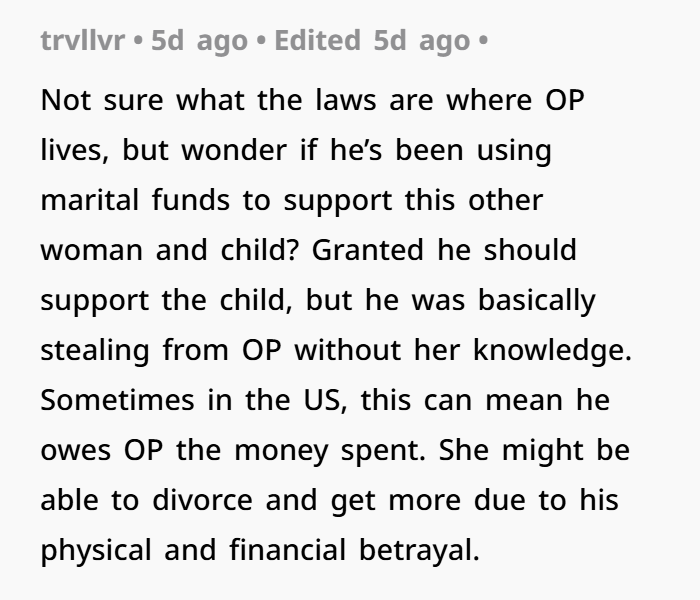
Finding out your husband had a love child with a neighbor family, who is half of your age is shocking – emotionally and financially. This is more than a betrayal — it is an emotional wound filled with the sandpaper-roughness of a restricting power imbalance, financial infidelity, and self-doubt. It totally makes sense why you would feel lost and confused as well as ask yourself all kinds of questions like whether you’re worth it or not, but here is the most important thing you need to remember: remotely even close to this betrayal is your fault.
You deserve to be treated with honesty, respect and a relationship based on trust. It is your healing and wellbeing that should be your priority, whether you want to rebuild or leave. Reach out for help, learn to stand up for yourself, and remember that this situation does not dictate your worth or destiny.

